Warning: there are some graphic images in this post. NSFW.
Not too long ago, I set myself the goal of viewing every SF/F film released in 2010. It figures that the first non-American film I decided to view would be one of the most ridiculous, violent, and bizarre films I have seen in a while. After being bullied by her classmates, high school student Rin (Yumi Sugimoto) returns home to discover that her father is actually a humanoid mutant known as a HILKO (or hiruko — the subtitles use HILKO, but descriptions of the film use “hiruko,” so I’m not sure which one is correct). But before she can take in this surprising news and its implications for herself, she and her parents are attacked by an anti-HILKO military unit. What follows is an all out bloodbath as Rin tries to escape not only the military, but the blood-thirst of her home town. Later, she is picked up by other HILKO members and trained and indoctrinated into a violent counter-revolutionary force run by Kisaragi (Tak Sakaguchi), who believes his pack of teen girl HILKOs are the perfect fighting force for making Japan a human-free zone.
Mutant Girls Squad, written and directed by Noboru Iguchi (among others), is, as I described it to Mike Underwood, not unlike a strange anime put together by John Waters and Quentin Tarantino. I’m still convinced that’s a fairly accurate description, though I also think there are unintentional traces of Existenz (1999) and John Dies at the End (2013) here, too, particularly in the way the film approaches its absurdist subject matter: with, at times, a complete indifference to rationalization, as if to say, “this is just how this world works.”
It’s that last idea that I want to discuss in more depth here instead of reviewing Mutant Girls Squad on evaluative terms. In truth, this is not a particularly good film; it is excessively gory and perverse, its humor relies far too much on its violence, and its narrative is so compressed that its action never lets up, preventing the characters from logically developing in response to changes in self or environment. And that, to me, seems like the point. This isn’t a movie about plots or characters. It’s a movie about excess and the absurdities that it implies. In this case, I think those excesses have a great deal more to do with Japan’s other major film genre, anime[1], than it does with the sorts of absurdist horror one might find in Tarantino’s Planet Terror (2007). In a sense, Mutant Girls Squad is simply an anime transplanted to the big screen, but with the added trappings of the live action genre, particularly since so much of this film directly ties to common narrative forms and concepts that appear in the animes I grew up with, and which undoubtedly have had a larger influence on Japanese pop culture. But rather than “simply” transplanting these things, I think the film also makes fun of them by simply inserting the absurdities one might find in, say, Dragonball Z or Pani Poni Dash (a stretch, perhaps; Magical Shopping Arcade Abenobashi might be a better choice), which seem to work well in the short, animated medium, into a “real” filmscape. Though this could make for a rather large argument, I’ll focus on two particular issues: the absurdity of the film’s mutations and the extremism of its violence.
One of the central conceits of Mutant Girls Squad (MGS from now on) is a trope that is so common in anime that it has its own genre: the magical girl (or majokko, and sometimes mahou shoujo). From the start of MGS, this trope is readily apparent. Rin discovers she is not wholly human and that her inhuman side contains extraordinary abilities. On its face, this seems fairly innocuous, as the majokko genre is rife with this formula (girl discovers powers; world changes). MGS, however, does not simply grant Rin powers, but makes her part of a varied and perverse order of mutations which are, if not shocking, then certainly confusing in their make. From Rin’s magic-indestructible-claw-slash-guitar-hand to boob swords to spiked protrusions that become erect when excited (this last serves as one of the obvious jokes about Kisaragi’s gender-queer status and the underlying impotence metaphor throughout), the film takes this idea to its (il)logical conclusion. These mutations and the powers they provide are, at times, functional, but, at other times (as in the case of the boob swords or the ass-chainsaw — yes, this exists in the film) are only functional to serve the plot (how one can fight with either of these objects in any serious sense is beyond me). MGS simply takes an already existing trope and rips it from a self-contained, real universe (though that’s not always the space in which magical girl narratives occur) into one where the rules don’t apply.
Similarly, MGS also draws its violence from the absurd and unreal. Much of the film’s action sequences involve copious amounts of watery blood, whether gushing like a fire hydrant from severed limbs or necks or exploding from mouths as a character’s innards are shoved from one end of the body and out the other. Entire sequences involve faces being cut apart and spun like casino machines, knives thrust into heads, tentacles shoved up rectums, and all manner of gross or absolutely insane sorts of violence.[2] So much of the violence is of this sort that it’s hard to take it seriously as violence. This isn’t meant to scare us or make us uncomfortable; rather, it serves as one long-running macabre joke on which so much of the narrative’s humor relies. This form also exists in anime, sometimes called “guro” (or grotesque), which derives from “ero guro” (or erotic grotesque). The second of these terms comes from a subset Japanese horror which contains explicit (sometimes excessive) sexualized violence; it is also frequently linked to anime subgenres such as hentai, though one can easily find “guro” or “ero guro” in some form within anime overall.
In the case of MGS, both forms of violence — the grotesque and sexualized violence — are presented in full force. Characters have their innards thrust through their mouths by tentacle arms inserted through their rears (as I’ve already noted); others are sprayed with blood from a metaphorical phallus (I won’t go into more detail than that). Heads are removed, along with limbs and many layers of skin. So much of this film is focused on violence that it is almost jarring when a touching and/or soft scene takes over the narrative space (one occurs near the end in what I can only describe as a HILKO lullaby involving Rin’s mutant hand strings). The violence is so insane that it is clearly meant for comedic effect, but I also see its insanity as a reflection of the kinds of violence which appears in so much anime of this kind. Since most anime is not ero guro/guro, to transplant and treat “seriously” the violence which permeates the field is to present no escape from actuality: this is what the film tells us will happen happen if a bunch of mutants with dangerous weapons comes slicing through a group of people. Death. Blood. Limbs. More death. There’s an almost ritualistic aspect to the violence in MSG, as if the film were fulfilling some need to make up for something it lacks.[3]
MGS is a film of no escapes, whether from its weirdness, its utterly batshit plotting, or its equally batshit violence.
As I said, I don’t think this is a particularly good film. Personally, I found its excesses, well, excessive. I could see what the film wanted me to see, but I also couldn’t help feeling that the actually decent performances from some of the actresses/actors, such as Yumi Sugimoto’s, were wasted on what can be reduced to one giant blood-infested perverted joke. At the same time, I suspect this is a matter of taste than anything else. Some will find Mutant Girls Squad hilarious in the way you enjoy a B-horror movie. And that, I guess, is worth something.
——————————————
A (World) SFF Film Odyssey is an extension of my personal mission to watch and review every science fiction and fantasy film released in 2010. All of the non-US titles will be reviewed/discussed/maimed on the Skiffy and Fanty blog as part of the World SF Tour. The rest can be on The World in the Satin Bag. You can find out more about this project here.
——————————————
[1]: Much of what I say here also applies to manga.
[2]: One scene involves a humorous duo of bakers who stage a kind of choreographed Dirty Dancing fight, which results in the woman’s body being cut into the shape of a bread roll — there’s another level to the joke here, but I won’t go into it now.
[3]: You’ll know what the film is missing if you ever watch it.


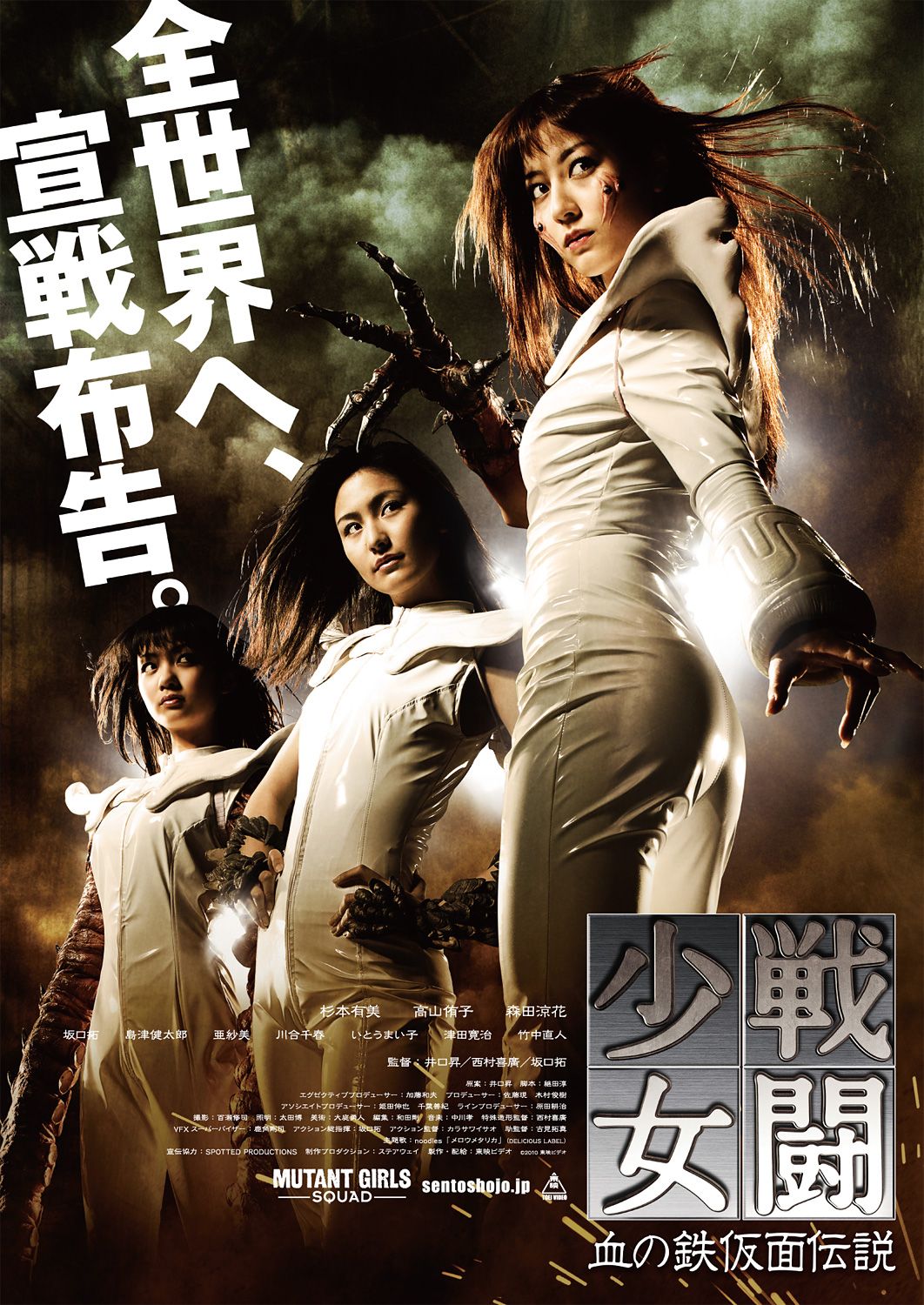
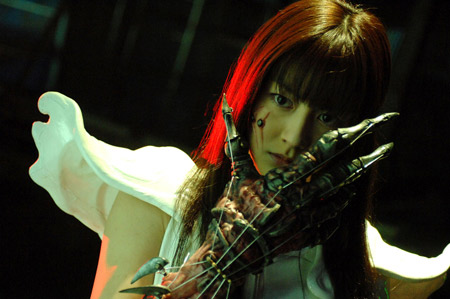
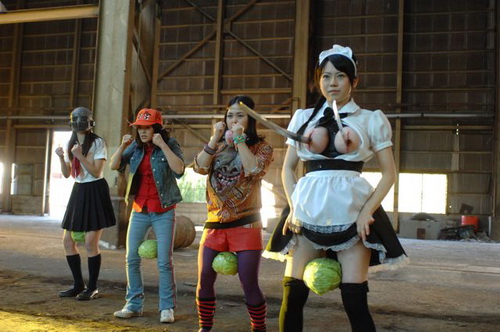
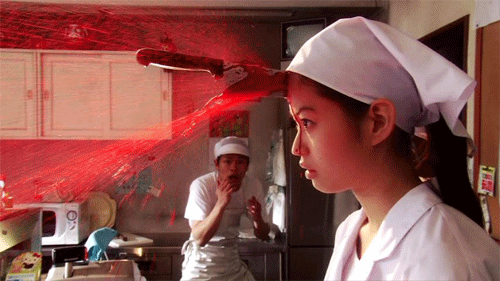
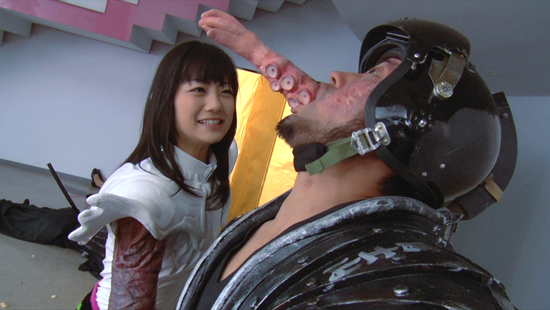
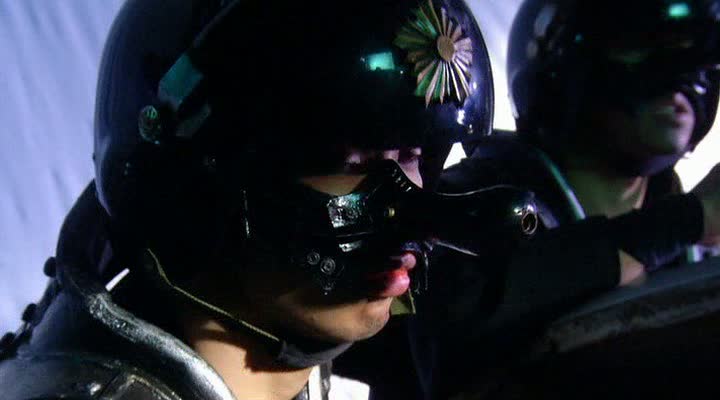







6 Responses